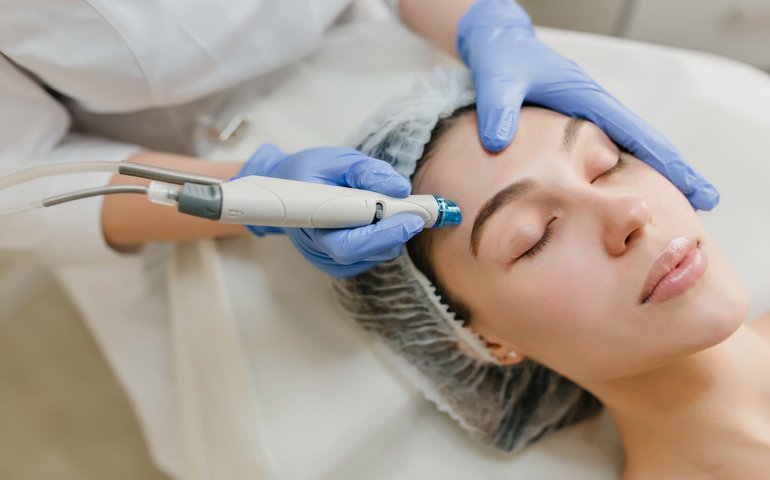The Dermatology Level 3 Advanced Diploma provides a comprehensive understanding of dermatology, covering skin conditions, diseases, diagnostic techniques, treatment options, and prevention strategies. Students explore the anatomy of the skin, learn to identify and manage various skin conditions, study dermatological diseases, and understand diagnostic tools and treatments. The course emphasizes preventive measures and patient education.
Overview
The Dermatology Level 3 Advanced Diploma is a comprehensive course designed to provide students with a thorough understanding of dermatology and its practical applications. Through a series of informative lectures and practical modules, students will explore various aspects of dermatology, including skin conditions, diseases, diagnostic techniques, treatment options, and prevention strategies. The course begins with an Introduction to Dermatology, where students will develop a foundational understanding of the field, including the anatomy and physiology of the skin, common terminology, and the role of a dermatologist in healthcare. Building upon this foundation, the course delves into the comprehensive study of Skin Conditions, covering a wide range of dermatological issues such as acne, eczema, psoriasis, and more. Students will learn to identify symptoms, understand underlying causes, and explore management strategies for each condition. In the following lectures, students will explore Skin Diseases and Disorders, gaining knowledge about various dermatological conditions including infectious diseases, autoimmune disorders, and skin cancers. They will study the pathophysiology, clinical features, and treatment options for these diseases. Diagnostic Techniques and Tools will be extensively covered, providing students with a comprehensive understanding of methods used in dermatological assessments, including physical examinations, biopsies, imaging techniques, and laboratory investigations. Treatment Options will focus on exploring different approaches to managing dermatological conditions. Students will learn about topical and systemic medications, surgical interventions, cosmetic procedures, and alternative therapies. Lastly, Prevention and Patient Education will be emphasized, equipping students with knowledge on preventive measures, lifestyle modifications, and patient education strategies to promote skin health and prevent dermatological conditions. By the end of this advanced diploma course, students will have developed a strong foundation in dermatology, gaining the skills and knowledge necessary to identify, diagnose, and treat a wide range of skin conditions. This course provides a solid platform for individuals aspiring to pursue a career in dermatology or healthcare professionals seeking to expand their expertise in dermatological care.What Will You Learn?
- A comprehensive understanding of dermatology, including the anatomy, physiology, and functions of the skin.
- Identification and assessment of various skin conditions, such as acne, eczema, psoriasis, and more.
- Knowledge of dermatological diseases and disorders, including infectious diseases, autoimmune conditions, and skin cancers.
- Familiarity with diagnostic techniques and tools used in dermatology, including physical examinations, biopsies, imaging techniques, and laboratory investigations.
- Treatment options for dermatological conditions, encompassing topical and systemic medications, surgical interventions, cosmetic procedures, and alternative therapies.
- Strategies for prevention and patient education to promote skin health and prevent dermatological conditions.
- Understanding the importance of a holistic approach to dermatological care, considering psychological and social factors impacting patients.
- Practical skills in assessing and managing dermatological conditions, including patient evaluation, developing treatment plans, and monitoring progress.
- Knowledge of ethical considerations and professional responsibilities in dermatological practice.
- Awareness of advancements and emerging trends in dermatology, facilitating ongoing professional development and staying updated with current research and practices.
Who Should Take The Course
- Aspiring dermatologists who wish to pursue a career in dermatology and need a comprehensive foundation in the field.
- Healthcare professionals, such as doctors, nurses, and physician assistants, seeking to enhance their knowledge and skills in dermatological care.
- Dermatology nurses or nurse practitioners aiming to expand their expertise and provide specialized care for patients with skin conditions.
- Aesthetic practitioners and skincare professionals interested in gaining a deeper understanding of dermatology to offer well-informed treatments and advice.
- Pharmacists or pharmaceutical professionals involved in the development and distribution of dermatological medications.
- Medical researchers or scientists focusing on dermatological studies and advancements in the field.
- Individuals working in medical education or training, looking to enhance their teaching capabilities in dermatology.
Requirements
- No specific educational background or prior qualifications are required.
- A genuine interest in dermatology and a desire to learn and expand your knowledge in the field.
- Proficiency in English to understand course materials and participate in discussions.
- Access to a computer or device with internet connectivity to access the course materials and resources.
- Basic computer skills to navigate online learning platforms and submit assignments.
- Self-motivation and discipline to engage with course materials and complete assignments within given timelines.
Course Curriculum
New Courses
Blogs
Jul'23
ADHD Training for Teachers: Empowering Educators to Support Students with Attention Challenges
Relationships may be severely harmed by narcissistic behaviours, leaving emotional scars and...
Jul'23
Narcissistic Behaviour and Relationships: Understanding the Impact and Finding Healing
Relationships may be severely harmed by narcissistic behaviours, leaving emotional...
Jul'23
Childhood Trauma in Adults
What Is Childhood Trauma? Childhood trauma refers to distressing or...
Jul'23
Creating A Social Media Strategy
Set Clear Objectives:The first step in developing a successful social media...
Jul'23
Neuro-Linguistic Programming Techniques
Neuro-Linguistic Programming (NLP) is a fascinating and widely acclaimed approach...
Jul'23
Acceptance and Commitment Therapy in the UK
What is acceptance and commitment therapy? Acceptance and Commitment Therapy...





